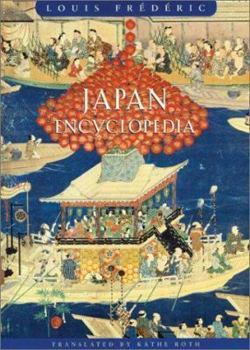Japan Encyclopedia
Select Format
Select Condition 
Book Overview
"Knowing Japan and the Japanese better," Louis Fr?d?ric states in the introduction to this encyclopedia, "is one of the necessities of modern life." The Japanese have a profound knowledge of every aspect and detail of Western societies. Unfortunately, we in the West cannot say the same about our knowledge of Japan. We tend to see Japan through a veil of exoticism, as a land of ancient customs and exquisite arts; or we view it as a powerful contributor to the global economy, the source of cutting-edge electronics and innovative management techniques. To go beyond these clich?s, we must begin to see how apparently contradictory aspects of modern Japanese culture spring from the country's evolution through more than two millennia of history. This richly detailed yet concise encyclopedia is a guide to the full range of Japanese history and civilization, from the dawn of its prehistory to today, providing clear and accessible information on society and institutions, commerce and industry, sciences, sports, and politics, with particular emphasis on religion, material culture, and the arts. The volume is enhanced by maps and illustrations, along with a detailed chronology of more than 2,000 years of Japanese history and a comprehensive bibliography. Cross-references and an index help the reader trace themes from one article to the next. Japan Encyclopedia will be an indispensable one-volume reference for students, scholars, travelers, journalists, and anyone who wishes to learn more about the past and present of this great world civilization.
Format:Hardcover
Language:English
ISBN:0674007700
ISBN13:9780674007703
Release Date:May 2002
Publisher:Belknap Press
Length:1102 Pages
Weight:4.30 lbs.
Dimensions:2.2" x 7.4" x 10.0"
Related Subjects
Asia Encyclopedias Geography Historical Study & Educational Resources History Japan Reference RegionalCustomer Reviews
1 rating
Not bad for a one-volume encyclopedia
Published by Thriftbooks.com User , 19 years ago
I picked up a copy of this book a few years ago and generally keep it around. This book was translated from French, and could probably do with a better translation. I do wonder whether Frederec actually wrote all of the articles, whether he edited the work, or merely lent his name to it. The short articles are for the most part fairly accessible and resonably accurate. The problem is that they are not all accurate. On the other hand, I have found inaccuracies in many other places including museum exhibits. Consequently, if you are a beginner or simply want a handy reference, this is a pretty good book to buy. However, the individual articles are not attested for authorship nor are they annotated for source. Yes! You can do better than this book. However, if you are in a position to do so, then you probably read Japanese and are using Japanese sources for much of your work. I am probably giving it one star more than I really should, but I beleive that its current average is too low. This book fills a niche between popular treatments and authoratative scholary treatments. If one keeps this in mind, then it can be quite useful.






